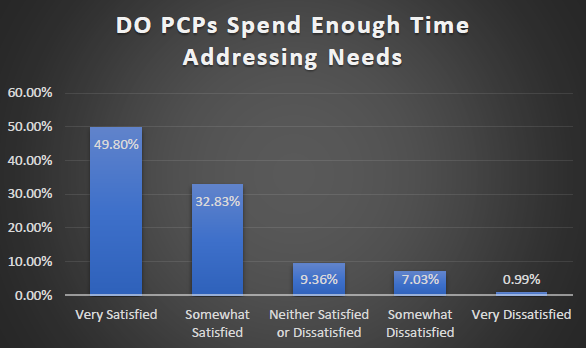Managed Care and the Doctor-Patient Relationship
Health Maintenance Organizations (HMOs), Preferred Provider Organizations (PPOs), and Point of Service (POS) plans are the most common examples of managed care in the U.S. An article published by the National Center for Biotechnology Information (NCBI) states;

Trusting your doctor goes a long way.
The rapid penetration of managed care into the health care market raises concern for many patients, practitioners, and scholars about the effects that different financial and organizational features might have on the doctor–patient relationship.
Observation Baltimore recently surveyed 1,964 residents of the Baltimore Metropolitan Statistical Area (MSA). The survey focused on respondent satisfaction regarding the doctor-patient relationship; specifically, the patient’s relationship with their primary care doctor.

Ninety-seven percent (97%) of Baltimore residents surveyed reported having health insurance coverage. Of the 97% with coverage 27% reported that they find it “extremely easy” to find a doctor in their area that participates in their health plan: 40% respond “very easy,” 23% “moderately easy,” 5% “slightly easy,” and 5% “not easy at all.” Ninety percent (90%) have a current primary care doctor. Of those respondents who indicate having a primary care doctor, 49% have been seeing that primary care doctor for 5 years or more. When asked “When you are not feeling well which of the following types of care are you most likely to seek?” those surveyed responded with the following: 55% “schedule an appointment to go see primary care doctor,” 37% “go to an urgent care clinic with or without an appointment,” 4% “go to a hospital ER,” and 4% “would not seek care.”

Perceived Quality of Care
The doctor–patient relationship has been and remains a keystone of care: it is the medium in which data are gathered, diagnoses and plans are made, compliance is accomplished, and healing, patient activation, and support are provided. To managed care organizations, its importance rests also on market savvy: satisfaction with the doctor–patient relationship is a critical factor in people’s decisions to join and stay with a specific organization.
Baltimore residents were asked a series of questions in order to gauge a perceived quality of care when visiting their primary care doctor. Eighty-seven percent (87%) are seen directly by their primary care doctor when visiting the office for a routine visit. The other 13% are seen by another doctor in the same practice or by a Physician Assistant. Patients’ satisfaction with how well their primary care doctor listens to their needs is reported as follows: 37% indicate “extremely well,” 40% “very well,” 20% “somewhat well,” and 3% “not so well or not at all.”
Communication is Key
Communication and understanding is key in any healthy and productive relationship so we asked “How well does your primary care doctor typically answer your questions?” Thirty-six percent (36%) of respondents indicated their primary care doctor answers their questions “extremely well,” 41% “very well,” 20% “somewhat well,” and 3% “not so well or not at all.” Among these respondents who have a primary care doctor, 95% say they feel like their doctor shows respect for what they have to say during visits.

Increasing data suggest that patients activated in the medical encounter to ask questions and to participate in their care do better biologically, in quality of life, and have higher satisfaction. A patient who does not trust or like the practitioner will not disclose complete information efficiently. A patient who is anxious will not comprehend information clearly. The relationship therefore directly determines the quality and completeness of information elicited and understood. It is the major influence on practitioner and patient satisfaction and thereby contributes to practice maintenance and prevention of practitioner burnout and turnover.
About Observation Baltimore
At Observation Baltimore, we understand that the success of your research is directly tied to the quality of your participants. Recognized as one of the top Maryland market research facilities, we believe that Experienced Recruiting Makes the Difference. Our experienced recruiting is the foundation of our mission, as well as courteous and proactive hospitality and client services. Just six minutes from BWI Airport and AMTRAK, our Baltimore facility has a great location. Most importantly, we understand market research!
To learn more about Observation Baltimore and how we can help with your next project here in Baltimore, contact us today. Visit www.observationbaltimore.com or call 410-332-0400 and ask for Ryan.
